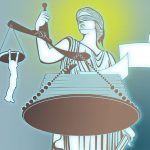It was argued in Federal Court this week that the secrecy of the process denies doctors natural justice.
Doctors pursued by the Professional Services Review are facing an arbitrary, secret and oppressive judiciary process, according to one Federal Court judge.
The Honourable Justice Logan RFD, presiding over Dr Anchita Karmakar’s case against Health Minister Greg Hunt, compared the PSR to a “Star Chamber” yesterday, TMR has been told.
The hearing in Brisbane lasted three days, and the parties now await a final judgment by Justice Logan.
(TMR did not attend the hearing, and our questions to Mr Hunt’s office have not yet received any response.)
Dr Karmakar was represented at trial by a legal team led by high-profile human rights barrister Julian Burnside QC and solicitor David Gardner, with barristers Rachel De Luchi and Benedict Coyne.
The trial comes almost four years after Dr Karmakar came to PSR attention for her billing while working as a GP registrar on the Gold Coast.
Dr Karmakar claims she was denied procedural fairness throughout the PSR process and was unable to have legal representation (the Health Insurance Act allows a lawyer to be present to advise but not to cross-examine, making it a waste of money to hire one).
In court this week, Ms De Luchi argued for Karmakar’s side that the secrecy clause in the Health Insurance Act means doctors have no access to previous case findings or deliberations by the PSR.
When the 106ZR clause is breached – such as when subjects of the PSR discuss their case with others – they may be subject to a penalty of 12 months’ imprisonment.
The secrecy clause was originally introduced for patient privacy; but, Dr Karmakar’s legal team argued, hiding personal information could be achieved by a method of simple redaction, with full concealment of files not necessary.
And while the clause doesn’t stop a doctor from discussing their PSR case with a lawyer, Dr Karmakar’s legal team argued that the clause should be overturned so that doctors are able to see the standards by which the system is finding clinicians guilty.
Dr Karmakar, talking to TMR after the hearing, said doctors who were unable to see the standards and benchmarks of previous PSR cases were being denied natural justice.
“If we win on the matter of the secrecy clause, it doesn’t necessarily mean that I will get exonerated [for my own PSR case] but it is still is a very big win for the entire profession,” she said.
Another matter raised in trial was the strike rate of the PSR.
The agency now has a two year record of finding 100% of the individuals who went before a PSR committee guilty of “inappropriate practice”.
And in the agency’s 2019-20 annual report, the PSR saw a 45% increase in the number of medical professionals being referred to them by the Department of Health for unusual billing or prescribing patterns, compared to the previous year.
Despite the results of her trial still pending, Dr Karmakar said her case getting so far was owed to the support of the medical profession and her legal team, who had chosen to represent her despite no guarantee of payment.
Dr Karmakar has crowd funded about $47,000 toward her legal campaign, but hopes to double those donations in the coming months.
“It was amazing just witnessing the legal profession standing up for us and having the medical profession come together in solidarity, to fight for our rights.”
And the passion was certainly present for Mr Burnside, who was admitted to hospital on Tuesday evening after having attended the first two days in court with his health deteriorating.
He is now in a stable condition, having spent the third day offering his expertise remotely to his team from his hospital bed.
“He deserves a very special mention because he literally compromised his health to push through the day, giving advice by phone – I just think it’s extraordinary what he has done for the medical profession,” said Dr Karmakar.
The trial was attended by several GPs, including her longtime supporter, former AMA president Dr Mukesh Haikerwal.
“I would say this is a remarkable culmination of many years of anguish for Dr Karmakar,” he told TMR.
“She was extraordinarily brave and forthright to put herself in this position to change a system that the judge characterised as being a ‘star chamber for doctors’, which is a fairly interesting reflection.”
Dr Haikerwal said that the PSR was a piece of compliance that affected every medical practitioner across the country, no matter their discipline.
“There are so many layers of compliance that we have to adhere to and PSR is one that really needs to be revised,” he said.
He said cases like Dr Karmakar’s were working to overhaul that system significantly.
Dr Haikerwal compared the PSR process to a train that doctors “can’t get off until the other end – when they’re found guilty”.
“There’s something basically wrong with a system that does that,” he said.






